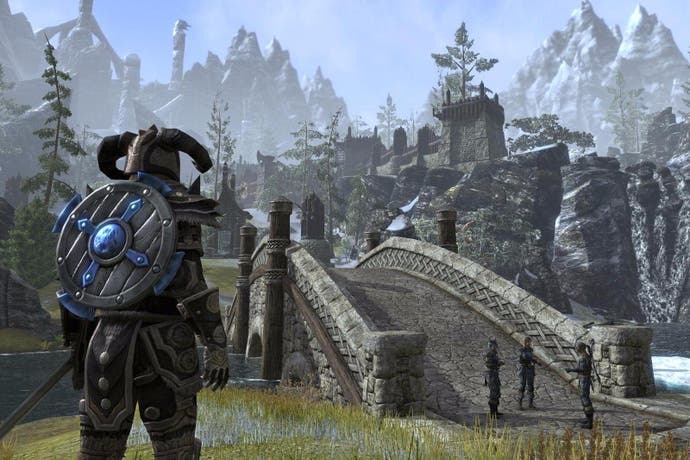Escaping Skyrim's shadow
And laying the ground for Elder Scrolls 6.
When I look back on my 90 hours with The Elder Scrolls 5: Skyrim, I think of constellations rearing gossamer heads over the hills near Whiterun. I think of sunken cities grown copper-green with age, of flipping through books for mention of long-extinct civilisations, and snow licking the path to the summit of the Throat of the World. OK, so I also think of dragons that fly backwards and that time I had to Fus Roh Dah a bug-stricken Lydia across a mountain range, but these are stray notes, hiccups in an otherwise blissful aria.
When I look back on my 20-odd hours with The Elder Scrolls Online, meanwhile, I think of crowds. Crowds of potato-faced adventurers clad in scraps of gaudy felt and tinfoil, loitering at stalls and forges, lost in menu screens. Crowds of ostensible Chosen Ones gamely waiting their turn to lay the smackdown on an area boss. These aren't altogether unpleasant memories - say what you like about ESO's world and quest design, but it offers customisation layers aplenty, atypically ferocious real-time combat, and in the shape of poor, embattled Cyrodiil, a distinctive take on the concept of PvP. But where the thought of Skyrim still fills me with yearning, the thought of ZeniMax Online's Tamriel leaves me scratching my head.
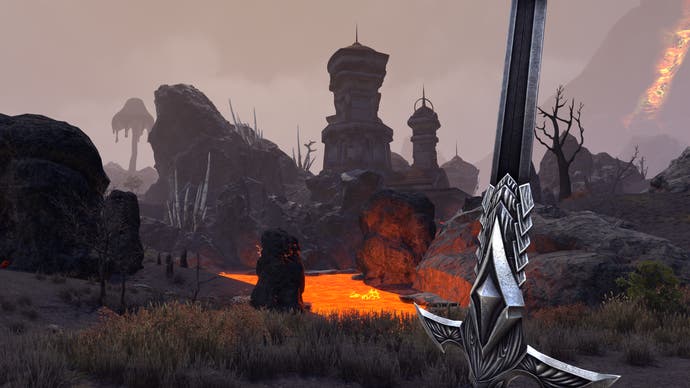
ESO has, in fairness, come an awful long way. What was once a late-to-the-party World of Warcraft knock-off is now a reasonably slick one-time-payment offering, buttressed by optional monthly subscriptions for premium content, lashings of new areas and a challenge scaling system introduced last year, which ensures that adventurers of all levels can quest together. These changes have apparently had a significant effect - according to game director Matt Firor, one and a half million additional people have played ESO since E3 2016, though he avoids the subject of how many are still active (at the time of writing the Tamriel Unlimited edition has 9,368 players on Steam, as against 19,848 for the vanilla edition of Skyrim). But for all the improvements, and for all the husky reminiscing over this summer's Morrowind expansion - which revisits or rather, previsits the setting of The Elder Scrolls 3 - ESO still feels like it's struggling for air.
That's the impression I take, anyway, from the Morrowind reveal presentation: an hour-long blowout that includes a well-rehearsed 20 minute development recap (I know it's well-rehearsed because there are articles from last October that reprise bits of it word for word), followed by a carefully stage-managed Q&A. In particular, the developer's paranoia about what exactly ESO is or isn't speaks volumes about its awareness of entrenched negative perception.
Firor dislikes the term "MMO", for example, because that implies endless grinding, whereas what we have here is a "modern console game", built for dabblers and diehards alike. He's not keen on "expansion", either, because that suggests you need to be a level-50 Dragonknight before you dare set foot on Vvardenfell, whereas this is an additional "chapter" that doubles as a 30-hour intro to the existing game. You get the sense that ZeniMax Online Studios would prefer not to label this "The Elder Scrolls Online" at all, really. Why not just call it "Morrowind", as the expanded edition's boxart ever-so-subtly invites you to? That way, it almost sounds like a brand new release, the official Elder Scrolls 3 remake that fans of the series have been clamouring for.
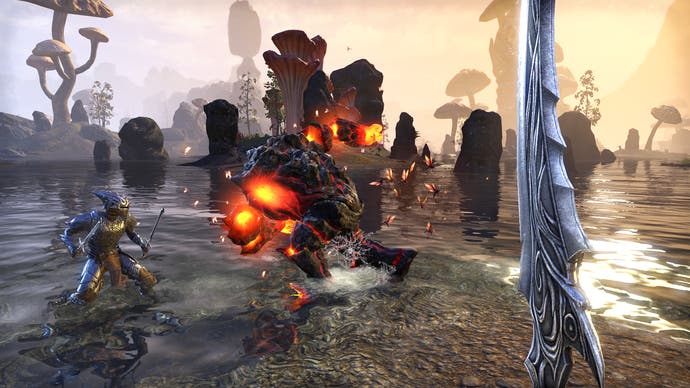
I begin my interview by asking how, exactly, one transforms a landscape originally sculpted for a lone hero into a playground for groups. Transferring the old Morrowind height map into ESO and plotting out key locations was, Firor says, "the easy part". "The hard part was then finding a storyline or some content that could either lead you there, or a game system that would get you there, or is it something that you just find? Some things like Dwemer ruins were even older than our game's [setting], so if it was a Dwemer ruin in Elder Scrolls 3 it's going to be a ruin in our game too. The Dwemer ruins are generally exactly the same.
"The Daedric ruins - some are a little newer, with maybe people still living in them, and some are destroyed. And then the towns and villages, sometimes there's a guy there who's talking about founding a village, and there's nothing there, and sometimes it's a whole city under construction. We kind of did what we could to make sure that the spirit of the original thing was there, but it's ours."
So where did ZeniMax Online Studios have the most creative license? "It's funny - if you go back and play Morrowind now, the Elder Scrolls 3, the one thing I personally miss are anything relating to helping you find NPCs that you need for quests. Back then it was like 'hey, talk to the guy by the tree on the road to Balmora', and it's up to you to find them. And of course, we're a modern game, so we have the compass, the map, and you just walk right there.
"I think by doing that you necessarily lose some of the exploration that made Elder Scrolls 3 so great, but we also on the other hand give players the ability to find things so that they don't get endlessly frustrated. In the end it's even on that one. But that's one example of where we couldn't just say 'they did this in the original Morrowind, we're going to do this the same way'."
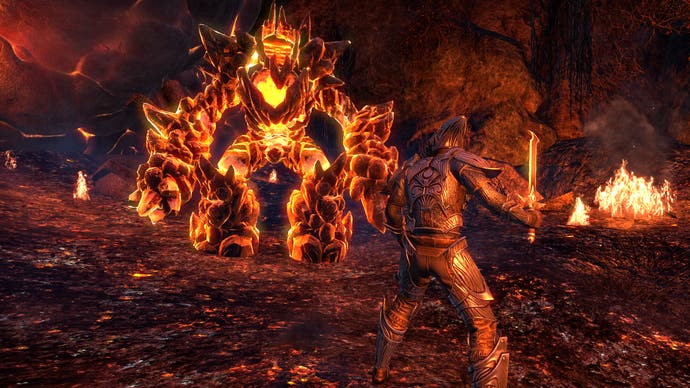
The question of how much freedom ZeniMax Online enjoys from Bethesda Game Studios seems knotty - it's the junior partner in the equation, but it's also charged with designing and implementing areas of Tamriel that may some day feature in a numbered Elder Scrolls game. "Where you see a blank part of the map - through chapters and DLC, we want to fill them in," Firor comments.
Isn't there the risk that ESO will steal Elder Scrolls 6's thunder, assuming the main series continues to be set in Tamriel? Apparently not. "We're 700 years behind the numbered games, and as long as we stick to the rules we have established with Bethesda Game Studios, and tell our own stories without destroying the world... as long as we stay on that, we can almost do whatever we want." So there's scope for Bethesda Game Studios to completely change the world in the next one? "Yeah." But at the very least, the addition of Vvardenfell to ESO's landscape means that a true Morrowind remake from Bethesda is unlikely? Firor is elusive. "That's all Bethesda's stuff, and I know that they are not working on that now, but I don't want to ever speak for them in the future."
As for why now is the right time to revive Morrowind, Firor insists it has nothing to do with dispelling apathy toward ESO through sheer force of nostalgia - last year's One Tamriel update, he says, has already rejuvenated the game. "People either came back, or we saw a lot of people who could finally get their friends into the game, because that's always the problem in level-based games - after three years you've finally talked your buddy into getting the game, and you're champion rank 600 and this guy's level two, and you don't want to roll a new character to play with him, so he just doesn't play. But now with One Tamriel you can actually play together with your main character and do what you want.
"That alone has brought a lot of people into the game. So we're really happy with where we are perception-wise. We picked Morrowind mostly because we wanted to do another giant, Orsinium-sized add-on, and if you look at the map, Vvardenfell is perfect - it's in an area that we've explored a bit, so we have some art, we understand who's living there, what the different races are, and we have a great Dark Elf character in Naryu Virian who can lead you into it. But it's an island, which means clear geographical barriers, it makes it easy to stop players who haven't purchased it from going there - you're not going to hit a wall in the middle of the world. It made sense on a lot of levels, and the fact that it was the first big Elder Scrolls game also made it attractive. It was kind of a combination of those things."
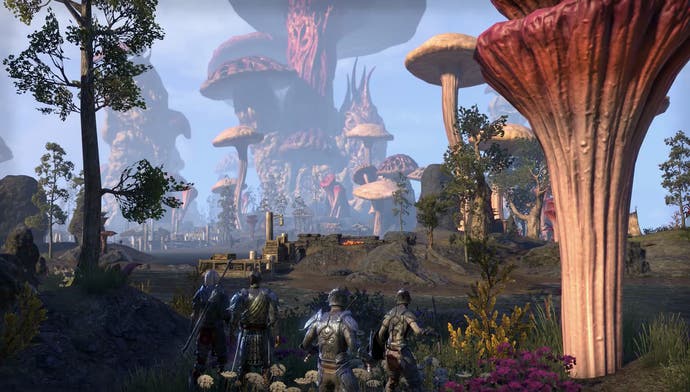
Even if ESO doesn't peg out territory subsequently dug into by a numbered Elder Scrolls game, it may supply a measure of technical and design insight. At the time of Skyrim's release, the idea of a clean split between online and offline gaming still had currency - nowadays, most of us expect to be looped into a digital community even when playing alone (though the ability to opt-out is, of course, important too). We expect, moreover, our worlds to undergo continual adjustment, both for the purposes of balancing and bug-testing, and for the sake of surprises like the alien invaders of Elite: Dangerous, or Hitman's Elusive Targets. It's very unlikely that the next numbered Elder Scrolls will offer multiplayer, though Bethesda did toy with adding it to 2015's Fallout 4, but it will all but certainly open itself up to online in ways Skyrim never did.
While he declines to comment on current goings-on at Bethesda, Firor does touch on this when I ask for his thoughts on what "MMO" actually means right now. "I think that the work on technology that your Dark Age of Camelots, the Everquests, the World of Warcrafts - that technology has seeped into everything in the industry, so that is the importance of those games today. The game design, let's face it - I made Dark Age of Camelot, and they were limited because they were super hardcore, PC-based for the most part. So I am glad, speaking purely for myself, that other genres have figured out how to use this technology in shooters, strategy games, and so on."
Every game can be an MMO these days, in other words, which leaves the genre as traditionally defined in a difficult position. The Elder Scrolls Online has improved immeasurably with age and, going by forum chatter, at least, has a committed core of players. It's possible that the tacit reboot that is the Morrowind expansion will grant it a new lease of life. But perhaps its real contribution to the series will be paving the way, both in terms of geography and methodology, for a game with extensive networked features that retains the majesty and loneliness of its predecessors. A game that is far from the hustle and bustle of an MMO, but a long way too from Skyrim.
